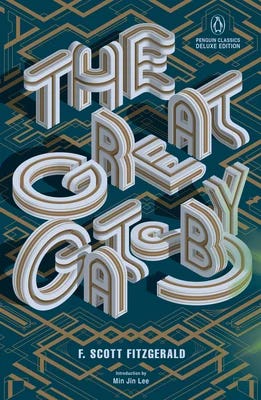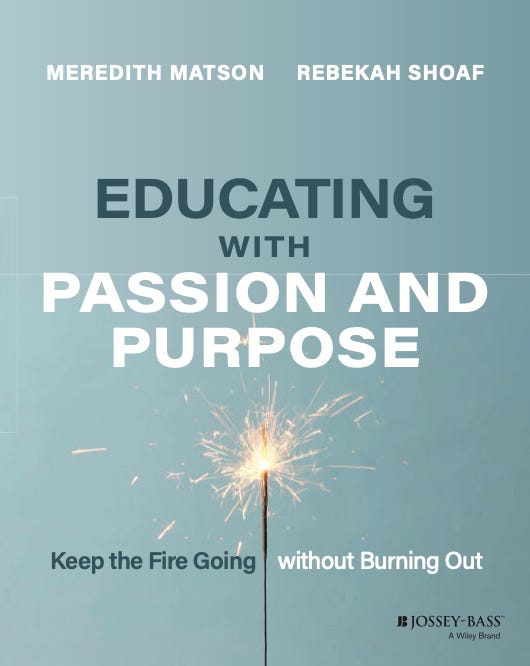“Not super germane to the topic.”
That’s the comment my editor left in the margin.
I talked it over with my co-author Meredith. We decided my experience undergoing fertility treatments while working full-time as a Lead Teacher in a New York City public high school was in fact extremely germane to the topic of teacher burnout.
We insisted on keeping the story in. You can read it in Chapter 7 of our book, Educating with Passion and Purpose: Keep the Fire Going without Burning Out.
There’s a lot more I could say about that—about struggling with my fertility as a teacher, about receiving that feedback from my editor, about the deeply protective relationship Meredith and I built by writing a book together, about the admonition that our personal lives are not “super germane” to our professional ones (especially for educators)–but for now I’m going to talk about one practice that helped me heal during that time, which was exactly ten years ago.
It was a hell I wouldn’t wish on my worst enemy.
One of the people who was instrumental in supporting me throught that hellish period was Adena Bright. She recently asked me to write about my experience for her own book about women's health.
Like so many of my writing experiences, I started out writing about one thing and came to realize I was actually writing about something else.
Meredith and I thought we were writing a book about burnout, and we ended up writing a book about purpose.
Adena asked me to write about castor oil packs, and I ended up writing about transformation: of my physical health and of my understanding of what real self-care is.
There’s so much out there right now about self-care–for everyone and especially for educators–and the products and services you need to buy to experience it. But I think that each of us has to decide for ourselves what real self-care is.
And that starts with uncovering your purpose.
Mine was to heal.
You can read my essay about self-care, healing, transformation, and castor oil packs(!) here.
Three ways to put these themes into practice:
If you have 3 minutes: Share a comment about a transformative practice that’s real self-care for you.
If you have 5 minutes: Forward this newsletter to someone in your life who’s going through a tough time right now. (My purpose in sharing my personal experiences more publicly over the past few years has been to write what I wish I’d been able to read when I was struggling with my fertility, health, marriage, and identity. I really needed to feel less alone, and my hope is that I’m helping other people feel less alone now.)
If you have 30 minutes: Schedule time on my calendar to chat about your experiences with educator burnout, self-care, or anything else that's on your mind. It's a free half hour of thought partnership.
On the Road
I’ve been working with schools in New York and Massachusetts this month. You can see photos of some of the highlights here and here. (Spoiler: one was receiving a bathroom key.)
Field Trip Fabulousness
As I shared recently on the Empowering Educators podcast, I think one of the most important things educators can do to build resilience is to carve out regular time for nourishing their inner lifelong learner.
Since the fall of 2020, I've done this by taking a field trip (almost) every week. The only rules are that I have to do it by myself and I have to approach it as a learner. And while I call it a field trip, sometimes the journey is intellectual, not geographical. It’s less about what I do or where I go than showing up as a lifelong learner.
My weekly field trips got an upgrade in January 2023 when I started reading The Artist’s Way by Julia Cameron. Cameron’s Artist Dates added a new element to my practice: she recommends that they be about two hours in length. So I blocked off 2-4pm on my calendar every Wednesday. (Now they happen whenever I can fit them in.)
I know two hours every week might feel absurd given the myriad responsibilities we all have, and for many of us it’s downright impossible. But if you’re curious about this practice, I challenge you to find a cadence that works for you.
Could you do 2 hours once a month?
Could you do 30 minutes every week?
In other words, what can you do?
Still stuck? Schedule time on my calendar and let’s brainstorm together.
Here are the weekly field trips I took in March 2024:
I saw The Taste of Things at O Cinema South Beach.
I took an intro adult ballet class at Miami City Ballet.
I visited Border Crossings: Exile and American Modern Dance 1900-1955 at the New York Public Library of the Performing Arts.
I went to Florals in Fashion, this year’s orchid show at the New York Botanical Garden. (See photos here!)
Rebekah's Reading Recs
I finished exactly 1 book* in March 2024:
I’ve read The Great Gatsby many, many times, but this was the first time without either my teacher or student hat on. I decided to pick it up again because on a recent episode of The Stacks host Traci Thomas shared that she was going to reread it. I’m so glad I did. I forgot how beautiful the language is, how radical and transgressive it is in some ways and how reductive and problematic it is in others, how funny it is (“Tom Buchanan, the polo player,” gets me every time), how much it speaks to those of us who came from elsewhere to become New Yorkers, and how prescient it is in its critique of American capitalism, even now, 99 years since it was first published. The introduction by Min Jin Lee, author of the masterpiece Pachinko, in the edition I checked out from the library really helped me apply a contemporary lens to my reading.
For several years I’ve been convinced that The Great Gatsby should not be required reading for American high school students, and I still think that. There are so many other books that speak to the adolescent experience of today, and I think it’s vital that teenagers see themselves reflected in the books they read. But if you are someone who’s only read The Great Gatsby with their teacher or student hat on, you might consider picking it–or another pillar of your high school curriculum (whether as the student you were or the teacher you are now) up again. I’d love to know what still speaks to you, what’s changed, and how you’re thinking about that now.
*Yep, you read that right. I’m in the middle of 3 others, so hopefully I’ll finish them in time to share about those next month.
Catch up on some of my recent podcast appearances:
What’s next?
As a coach and consultant, I help educators stay connected to their passion and purpose so they can provide all students with joyful, enchanting, empowering learning experiences–without burning out.
I work with teachers, leaders, teams, schools, districts, and other organizations to find the intersection of effectiveness and sustainability.
Thank you for reading this issue of The Cocoon! I’ll see you next month.
I live and work in New York City and Miami on the historical and current homelands of the Wappinger and Munsee Lenape, and the Seminole and Miccosukee people, respectively. They called these regions home for many years before Dutch, British, Spanish, and American colonizers arrived and stole from them, desecrated their sacred lands, and attempted to eradicate their existence. And still they endure.











Self-care is reading what you write; your writing--your perspective and vulnerability--is always very inspiring to me!
Yummiest not yummy ass.